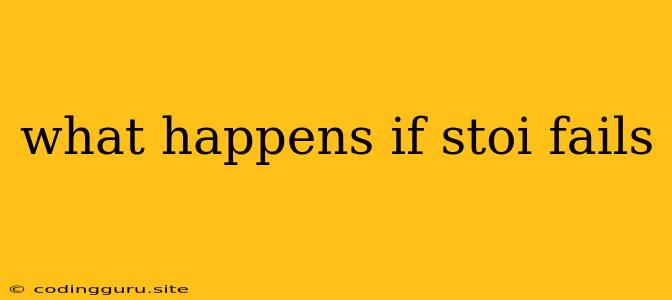What Happens if stoi Fails?
In the world of C++, stoi is a powerful tool for converting strings to integers. However, like any tool, it has limitations. One crucial aspect to understand is what happens when stoi encounters a string that it cannot convert to an integer.
Let's break down the potential scenarios and how to handle them:
1. Invalid Input:
The most common reason for stoi to fail is encountering invalid characters within the string. stoi expects a string representation of a valid integer, potentially with leading plus or minus signs. Any other character, such as letters, spaces, or special symbols, will cause the function to throw an std::invalid_argument exception.
Example:
#include
#include
#include
int main() {
std::string str1 = "123";
std::string str2 = "123abc";
std::string str3 = "123.45";
try {
int num1 = std::stoi(str1);
std::cout << "str1 converted to: " << num1 << std::endl;
} catch (const std::invalid_argument& e) {
std::cerr << "Error converting str1: " << e.what() << std::endl;
}
try {
int num2 = std::stoi(str2);
std::cout << "str2 converted to: " << num2 << std::endl;
} catch (const std::invalid_argument& e) {
std::cerr << "Error converting str2: " << e.what() << std::endl;
}
try {
int num3 = std::stoi(str3);
std::cout << "str3 converted to: " << num3 << std::endl;
} catch (const std::invalid_argument& e) {
std::cerr << "Error converting str3: " << e.what() << std::endl;
}
return 0;
}
Output:
str1 converted to: 123
Error converting str2: stoi
Error converting str3: stoi
2. Overflow:
If the string represents an integer that exceeds the range of the target integer type (e.g., int, long), stoi throws an std::out_of_range exception.
Example:
#include
#include
#include
int main() {
std::string str1 = "2147483647"; // Maximum value for int
std::string str2 = "2147483648"; // Exceeds int range
try {
int num1 = std::stoi(str1);
std::cout << "str1 converted to: " << num1 << std::endl;
} catch (const std::out_of_range& e) {
std::cerr << "Error converting str1: " << e.what() << std::endl;
}
try {
int num2 = std::stoi(str2);
std::cout << "str2 converted to: " << num2 << std::endl;
} catch (const std::out_of_range& e) {
std::cerr << "Error converting str2: " << e.what() << std::endl;
}
return 0;
}
Output:
str1 converted to: 2147483647
Error converting str2: stoi
Handling stoi Failures:
1. Exception Handling:
The most robust approach is to use exception handling with try and catch blocks. This allows you to gracefully handle both std::invalid_argument and std::out_of_range exceptions, preventing program crashes:
try {
int num = std::stoi(str);
// Process the converted integer
} catch (const std::invalid_argument& e) {
std::cerr << "Invalid input: " << e.what() << std::endl;
} catch (const std::out_of_range& e) {
std::cerr << "Integer overflow: " << e.what() << std::endl;
}
2. Error Checking:
Instead of exceptions, you can use the std::stoi overload that takes a third argument, an std::size_t* pointer, to check if the conversion was successful:
std::size_t pos;
try {
int num = std::stoi(str, &pos);
if (pos != str.length()) {
// Input contained extra characters
std::cerr << "Invalid input: extraneous characters" << std::endl;
} else {
// Successful conversion
std::cout << "Converted to: " << num << std::endl;
}
} catch (const std::out_of_range& e) {
std::cerr << "Integer overflow: " << e.what() << std::endl;
}
3. Conditional Conversion:
If you expect only valid integers and want to skip invalid inputs, you can use conditional conversion with std::isdigit:
if (std::all_of(str.begin(), str.end(), ::isdigit)) {
try {
int num = std::stoi(str);
// Process the integer
} catch (const std::out_of_range& e) {
// Handle overflow
}
} else {
// Handle invalid input
}
Key Points:
stoiis designed to convert strings to integers with a high degree of efficiency.- It's crucial to understand the potential failure scenarios, especially when dealing with user input or data from external sources.
- Proper error handling is essential to ensure your program's stability and prevent unexpected crashes.
Conclusion:
Understanding what happens if stoi fails is critical for writing reliable C++ code. By implementing appropriate error handling techniques, you can ensure robust and predictable behavior, even when working with potentially invalid input or data that might exceed integer limits.
